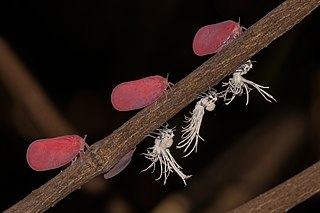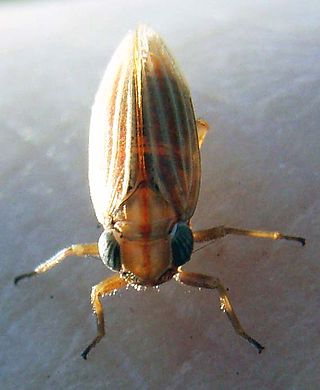
The family Fulgoridae is a large group of hemipteran insects, especially abundant and diverse in the tropics, containing over 125 genera worldwide. They are mostly of moderate to large size, many with a superficial resemblance to Lepidoptera due to their brilliant and varied coloration. Various genera and species are sometimes referred to as lanternflies or lanthorn flies, but neither do their heads emit light, nor are they even distantly related to flies.

Acanalonia is a genus of planthopper and contains the majority of the species within the family Acanaloniidae. Species have been recorded from southern Europe and the Americas.

Flatidae are a family of fulgoroid planthoppers. They are cosmopolitan in distribution and are distinguished from others in the superfamily by a combination of characters. Like all other planthoppers, they suck phloem sap of plants. Some species are known to communicate with vibrations through the plant stems. Communication may be with mates, or with ants that tend the nymphs, protecting them and gathering honeydew secretions. Adults of some species have brightly coloured forewings which are tougher and known as tegmina unlike the membranous hindwings which are used for flight. Although a few can be identified by their coloration, most species requires dissection and examination under a microscope with access to literature on already described species.

Issidae is a family of planthoppers described by Spinola in 1839, belonging to the order Hemiptera, suborder Auchenorrhyncha superfamily Fulgoroidea.

Nogodinidae is a family of planthoppers. They have membranous wings with delicate venation and can be confused with members of other Fulgoroid families such as the Issidae and Tropiduchidae. Some authors treat it as a subfamily of the Issidae.

Caliscelidae is a family of planthoppers, sap-sucking insects that belong to the order Hemiptera, suborder Auchenorrhyncha and superfamily Fulgoroidea. They are somewhat anomalous and have often been included within the family Issidae. Studies made in 2013 of the phylogeny of the Issidae and other groups using molecular techniques support the treatment of the group as a separate family. Sexual dimorphism can be marked. Some members of the family are called piglet bugs due to the shape of their snout. A particularly aberrant genus described in 2011 from India, Formiscurra, has males that resemble ants.

Flatormenis is a genus of flatid planthoppers in the family Flatidae from North and central America. There are about 15 described species in Flatormenis.

Achilidae is a family of planthoppers, sometimes called "achilids" in the order Hemiptera. There are at least 520 described species in Achilidae.
Mabira is a genus of achilid planthoppers in the family Achilidae. There are at least four described species in Mabira.

Aplos is a genus of issid planthopper with only one species, Aplos simplex. It can be found in most of the Eastern United States and is now found as an invasive species in Northern Italy and Austria. Aplos simplex was formerly listed under the genus Thionia.

Cenchreini is a tribe of derbid planthoppers in the family Derbidae. There are at least 30 genera in Cenchreini.

Derbinae is a subfamily of derbid planthoppers in the family Derbidae.

Dictyopharinae is a subfamily of dictyopharid planthoppers in the family Dictyopharidae. There more than 100 genera and 500 described species in Dictyopharinae.

Acanaloniidae is a family of planthoppers. It is sometimes treated as a subfamily of Issidae.

The Flatinae are a subfamily of planthoppers, erected by Maximilian Spinola in 1839. Genera have been recorded from all continents except Antarctica: especially in tropical and subtropical regions.
Cheiloceps is a genus of planthoppers in the family Issidae. Cheiloceps was described as a genus by Uhler, 1895, downgraded by Fennah, 1955 to a subgenus of Thionia; then restored to genus status by Gnezdilov, 2018.
Oronoqua is a genus of issid planthopper in the family Issidae and can be found in the northern Neotropics. The difference in fore and hind wing venations between species of Oronoqua and the other genera in Thioniini led to a subtribe Oronoquina being erected.

Picumna is a genus of planthopper in the family Issidae. They can be found in the Southwestern United States and Central America. Picumna species are often confused with Thionia species, but can be differentiated as Picumna have four spines on their hind tibia, whereas Thionia have fewer.

The Nogodininae are a sub-family of tropical planthoppers erected by Leopold Melichar in 1898. The recorded distribution is: South America, Africa and the Middle East, South and SE Asia through to Australia.
















